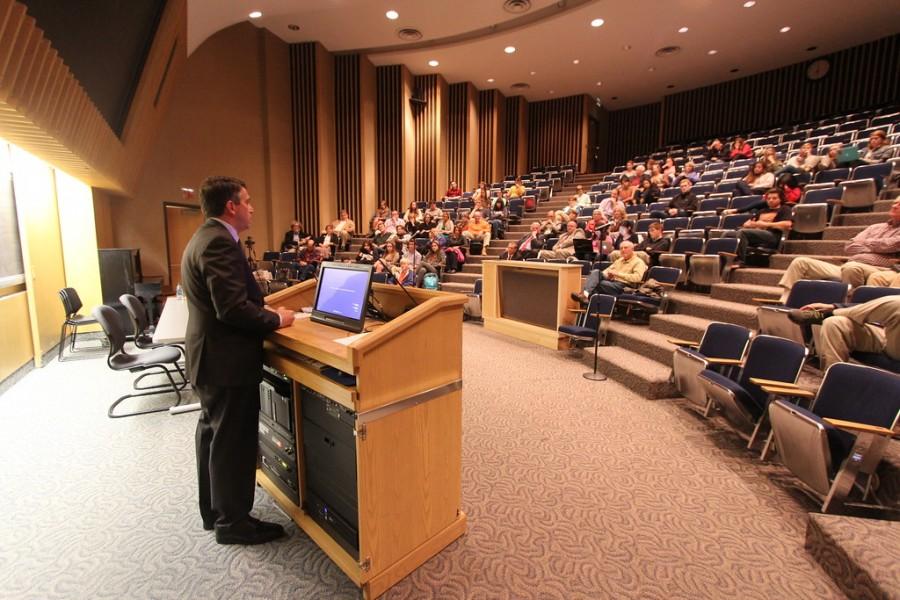FOX Correspondent James Rosen visits University: Journalist & author talks Trump, the rise of ISIS, and the war on press freedoms
October 7, 2015
“We meet at a time of considerable upheaval, at home and abroad,” chief Washington correspondent for FOX News James Rosen said, as he opened his talk at the University on Oct. 1. “I come as that loathed species, the reporter, but I aim to dazzle you.”
Rosen, author of “The Strong Man: John Mitchell and the Secrets of Watergate,” visited the University for a discussion of foreign policy, national security, and the 2016 elections. His visit, orchestrated collaboratively between the Conservatives Club, the CAP Center, and the Political Science Department, attracted an audience of roughly 80 people in the LC Forum that evening.
Conservatives Club President Ethan Wise ’17 said that the first connection the University made with Rosen was over Twitter.
“It took over a year to bring him to campus, just through scheduling conflicts and funding requirements, but someone from the club contacted him on Twitter and started the ball rolling before my leadership,” Wise said.
In his opening remarks, Rosen stressed his intent for a “non-partisan” evening. He told stories of his many high-profile interviews with the likes of Hillary Clinton and Dick Cheney and offered light-hearted commentary on popular subjects like the candidates of the upcoming presidential election. Rosen spoke candidly about Donald Trump and his role in modern politics, often referencing his own experiences in journalism as well as his appreciation for the historical viewpoint to give commentary on the current Republican front-runner.
“Trump is a new figure in the world of elected politics, but by no means a new figure in media. He’s a tabloid figure,” Rosen said. Rosen joked about Trump’s “kind, gentle, and unifying” campaign while making the comparison that Trump’s campaign makes William Tecumseh Sherman’s “March to the Sea” look like a race for the cure.
“We see the Democratic candidate looking to make history as the first female presidential candidate,” Rosen said of Clinton. “We have to stop for a moment and puzzle over this. The [Democratic] party that has so prized youth, beauty, and progressivism has either stifled development of the fresh, new talent or the members of The Grateful Dead have refused to run.”
Aside from his punchy one-liners, Rosen projected many of the serious consequences Americans face abroad in light of current events like ISIS, the Iran nuclear deal, and Russia.
Overseas, “the state of affairs lends itself less to chuckling,” Rosen said.
Russia’s unsanctioned military actions on Syria were “a unilateral attempt unsanctioned by the U.N. Security Council nor any other relevant international body,” Rosen said. “Saudi Arabia is doing the same thing in Yemen; Iran is doing it in Iraq.”
The Iran nuclear deal “is an attempt to square a circle. It’s an attempt to take a regime that has lied, cheated, deceived the international community with its nuclear program and it’s an attempt to subject such a beast to the familiar, if not tired, models of arms control verification,” Rosen said.
Rosen urged audience members to think critically about a wide range of international issues, including Russia’s status as a U.S. ally.
“Russia is supposed to make sure Iran complies,” Rosen said.
But in August, in a story broken by FOX News, “we made a confirmation that the general of the Iranian Quds force, Qasem Soleimani, credited with killing 500 Americans during the Iraq war, made a visit to Moscow to discuss arms sales,” Rosen said.
“Russia was happy to host this man in violation of U.S. sanctions,” Rosen said. “That’s the state of the international order today. These [international] forces come together in a way that’s frightening. We see ethnic tensions, very distinct to our century, and we see the rise of non-state actors like ISIS.”
Rosen warned of the impact that these actors will have, not just on Barack Obama’s last term as president but also on our country’s future leader.
Rosen also discussed his personal involvement with issues like national security.
“The dynamics that we see overseas we see here at home,” Rosen said.
In May 2013, the Washington Post reported “to the world, including me” that the FBI had submitted a search warrant application to a federal judge in secret, which the judge signed, to rifle through “my private Gmail accounts, faxes, and FOX News lines (including contacts for the White House and State Departments),” Rosen said.
“They declared me to be a criminal co-conspirator with an alleged source inside the State Department,” Rosen said. “Through Watergate and the Pentagon Papers, a reporter was never designated a criminal.”
It was the first time in modern history that the federal government had designated a reporter a criminal for doing his job. Rosen described his own experience as a part of a “broader war on press freedoms” unlike “anything seen in previous administrations.”
Concluding the talk, Rosen fielded questions from audience members ranging from Megyn Kelly and Trump’s disastrous comments after the first televised GOP debate for the 2016 presidential election to Russia’s strategic moves against Syria.






















